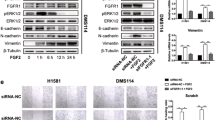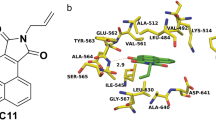Abstract
Molecular-targeted therapies for lung squamous cell carcinoma (LSCC) are limited mainly because targetable oncogenic aberrations are absent in LSCC. Recent genomic analyses have revealed that the fibroblast growth factor (FGF) signaling pathway plays a fundamental role in LSCC progression via cancer cell proliferation and angiogenesis. In the present study, we designed, expressed, and purified a fibroblast growth factor receptor fragment (FGFR1-Fc) fusion protein using NS/0 cells. In FGF2-FGFR1 overexpressed NCI-H1703 cells, the FGFR1-Fc fusion protein effectively inhibited proliferation and invasion and arrested the cell cycle at the G0-G1 phase. In NCI-H1703 cells treated with the FGFR1-Fc fusion protein, the phosphorylation levels of FGFR1, FRS2, ERK, and AKT were significantly reduced. Using an siRNA assay, we demonstrated that FGF2-FGFR1 is the major anti-tumor target of FGFR1-Fc fusion the FGFR1-Fc fusion protein, which also significantly inhibited proliferation and invasion by NCI-H1703 cells via the FGF2-FGFR1 signaling pathway. In addition, the FGFR1-Fc fusion protein significantly inhibited angiogenesis in an embryonic chorioallantoic membrane model. The FGFR1-Fc fusion protein may be an effective therapeutic candidate for LSCC.




Similar content being viewed by others
Data Availability
All data and materials are true and reliable.
References
Thai, A. A., Solomon, B. J., Sequist, L. V., Gainor, J. F., & Heist, R. S. (2021). Lung cancer. Lancet, 398, 535–554. https://doi.org/10.1016/S0140-6736(21)00312-3
Drilon, A., Rekhtman, N., Ladanyi, M., & Paik, P. (2012). Squamous-cell carcinomas of the lung: Emerging biology, controversies, and the promise of targeted therapy. Lancet Oncology, 13, e418–e426. https://doi.org/10.1016/S1470-2045(12)70291-7
Rich, A. L., Khakwani, A., Free, C. M., Tata, L. J., Stanley, R. A., Peake, M. D., et al. (2015). Non-small cell lung cancer in young adults: Presentation and survival in the English National Lung Cancer Audit. QJM: An International Journal of Medicine, 108, 891–897. https://doi.org/10.1093/qjmed/hcv052
Cheng, Z., Yu, C., Cui, S., Wang, H., Jin, H., Wang, C., et al. (2019). circTP63 functions as a ceRNA to promote lung squamous cell carcinoma progression by upregulating FOXM1. Nature Communications, 10, 3200. https://doi.org/10.1038/s41467-019-11162-4
Gandara, D. R., Hammerman, P. S., Sos, M. L., Lara, P. N., Jr., & Hirsch, F. R. (2015). Squamous cell lung cancer: from tumor genomics to cancer therapeutics. Clinical Cancer Research, 21, 2236–2243. https://doi.org/10.1158/1078-0432.CCR-14-3039
Momcilovic, M., Bailey, S. T., Lee, J. T., Fishbein, M. C., Braas, D., Go, J., et al. (2018). The GSK3 signaling axis regulates adaptive glutamine metabolism in lung squamous cell carcinoma. Cancer Cell, 33(5), 905–921. https://doi.org/10.1016/j.ccell.2018.04.002
Goodwin, J., Neugent, M. L., Lee, S. Y., Choe, J. H., Choi, H., Jenkins, D. M. R., et al. (2017). The distinct metabolic phenotype of lung squamous cell carcinoma defines selective vulnerability to glycolytic inhibition. Nature Communications, 8, 15503. https://doi.org/10.1038/ncomms15503
Beenken, A., & Mohammadi, M. (2009). The FGF family: Biology, pathophysiology and therapy. Nature Reviews Drug Discovery, 8, 235–253. https://doi.org/10.1038/nrd2792
Katoh, M., & Nakagama, H. (2014). FGF receptors: Cancer biology and therapeutics. Medicinal Research Reviews, 34, 280–300. https://doi.org/10.1002/med.21288
Babina, I. S., & Turner, N. C. (2017). Advances and challenges in targeting FGFR signalling in cancer. Nature Reviews Cancer, 17, 318–332. https://doi.org/10.1038/nrc.2017.8
Katoh, M. (2016). Therapeutics targeting FGF signaling network in human diseases. Trends in Pharmacological Sciences, 37, 1081–1096. https://doi.org/10.1016/j.tips.2016.10.003
Hashemi-Sadraei, N., & Hanna, N. (2017). Targeting FGFR in squamous cell carcinoma of the lung. Target Oncology, 12, 741–755. https://doi.org/10.1007/s11523-017-0513-6
Yuan, H., Li, Z. M., Shao, J., Ji, W. X., Xia, W., & Lu, S. (2017). FGF2/FGFR1 regulates autophagy in FGFR1-amplified non-small cell lung cancer cells. Journal of Experimental & Clinical Cancer Research, 36, 72. https://doi.org/10.1186/s13046-017-0534-0
Marek, L., Ware, K. E., Fritzsche, A., Hercule, P., Helton, W. R., Smith, J. E., et al. (2009). Fibroblast growth factor (FGF) and FGF receptor-mediated autocrine signaling in non-small-cell lung cancer cells. Molecular Pharmacology, 75, 196–207. https://doi.org/10.1124/mol.108.049544
Loriot, Y., Necchi, A., Park, S. H., Garcia-Donas, J., Huddart, R., Burgess, E., et al. (2019). Erdafitinib in locally advanced or metastatic urothelial carcinoma. New England Journal of Medicine, 381, 338–348. https://doi.org/10.1056/NEJMoa1817323
Abou-Alfa, G. K., Sahai, V., Hollebecque, A., Vaccaro, G., Melisi, D., Al-Rajabi, R., et al. (2020). Pemigatinib for previously treated, locally advanced or metastatic cholangiocarcinoma: A multicentre, open-label, phase 2 study. Lancet Oncology, 21, 671–684. https://doi.org/10.1016/S1470-2045(20)30109-1
Goyal, L., Shi, L., Liu, L. Y., Fece de la Cruz, F., Lennerz, J. K., Raghavan, S., et al. (2019). TAS-120 overcomes resistance to ATP-competitive FGFR inhibitors in patients with FGFR2 fusion-positive intrahepatic cholangiocarcinoma. Cancer Discovery, 98, 1064-1079. https://doi.org/10.1158/2159-8290.CD-19-0182.
Chen, L., Fu, W., Zheng, L., Liu, Z., & Liang, G. (2018). Recent progress of small-molecule epidermal growth factor receptor (EGFR) inhibitors against C797s resistance in non-small-cell lung cancer. Journal of Medicinal Chemistry, 61, 4290–4300. https://doi.org/10.1021/acs.jmedchem.7b01310
Katoh, M. (2016). FGFR inhibitors: Effects on cancer cells, tumor microenvironment and whole-body homeostasis (Review). International Journal of Molecular Medicine, 38, 3–15. https://doi.org/10.3892/ijmm.2016.2620
Harding, T. C., Long, L., Palencia, S., Zhang, H., Sadra, A., Hestir, K., et al. (2013). Blockade of nonhormonal fibroblast growth factors by FP-1039 inhibits growth of multiple types of cancer. Science Translational Medicine, 5, 178ra139. https://doi.org/10.1126/scitranslmed.3005414
Eswarakumar, V. P., Lax, I., & Schlessinger, J. (2005). Cellular signaling by fibroblast growth factor receptors. Cytokine & Growth Factor Reviews, 16, 139–149. https://doi.org/10.1016/j.cytogfr.2005.01.001
Xie, Y., Zinkle, A., Chen, L., & Mohammadi, M. (2020). Fibroblast growth factor signalling in osteoarthritis and cartilage repair. Nature Reviews Rheumatology, 16, 547–564. https://doi.org/10.1038/s41584-020-0469-2
Itoh, N., & Ornitz, D. M. (2011). Fibroblast growth factors: From molecular evolution to roles in development, metabolism and disease. The Journal of Biochemistry, 149, 121–130. https://doi.org/10.1093/jb/mvq121
Malchers, F., Dietlein, F., Schottle, J., Lu, X., Nogova, L., Albus, K., et al. (2014). Cell-autonomous and non-cell-autonomous mechanisms of transformation by amplified FGFR1 in lung cancer. Cancer Discovery, 4, 246–257. https://doi.org/10.1158/2159-8290.CD-13-0323
Kim, H. R., Kim, D. J., Kang, D. R., Lee, J. G., Lim, S. M., Lee, C. Y., et al. (2013). Fibroblast growth factor receptor 1 gene amplification is associated with poor survival and cigarette smoking dosage in patients with resected squamous cell lung cancer. Journal of Clinical Oncology, 31, 731–737. https://doi.org/10.1200/JCO.2012.43.8622
Turner, N., Pearson, A., Sharpe, R., Lambros, M., Geyer, F., Lopez-Garcia, M. A., et al. (2010). FGFR1 amplification drives endocrine therapy resistance and is a therapeutic target in breast cancer. Cancer Research, 70, 2085–2094. https://doi.org/10.1158/0008-5472.CAN-09-3746
Flockerzi, F. A., Roggia, C., Langer, F., Holleczek, B., & Bohle, R. M. (2017). FGFR1 gene amplification in squamous cell carcinomas of the lung: A potential favorable prognostic marker for women and for patients with advanced cancer. Virchows Archiv, 472, 759–769. https://doi.org/10.1007/s00428-017-2282-0
Soleimanpour, S., Hassannia, T., Motiee, M., Amini, A. A., & Rezaee, S. A. (2017). Fcgamma1 fragment of IgG1 as a powerful affinity tag in recombinant Fc-fusion proteins: Immunological, biochemical and therapeutic properties. Critical Reviews in Biotechnology, 37, 371–392. https://doi.org/10.3109/07388551.2016.1163323
Unverdorben, F., Richter, F., Hutt, M., Seifert, O., Malinge, P., Fischer, N., et al. (2016). Pharmacokinetic properties of IgG and various Fc fusion proteins in mice. MAbs, 8, 120–128. https://doi.org/10.1080/19420862.2015.1113360
Long, L., Brennan, T., Zanghi, J., Palencia, S., Cheung, R., Aguirre, M., Powers, J., Dean, R., Giese, S., Keer, H., Masuoka, L., Doberstein, S., Minmin, Q., Hestir, K., Williams, L., Baker, K., et al. (2009). Antitumor efficacy of FP-1039, a soluble FGF receptor 1:Fc conjugate, as a single agent or in combination with anticancer drugs. Experimental and Molecular Therapeutics, 69(9).
Funding
This work was supported by the Natural Science Funding of Zhejiang Province (LYY19H310006 to L.Z., Y21H150027) and the Science and technology plan project of Wenzhou City (Y20150105).
Author information
Authors and Affiliations
Contributions
(I) Conception and design: L. Zheng; (II) Administrative support: Q. Hui, B. Liu, X. Wang; (III) Provision of study materials or patients: L. Chen; (IV) Collection and assembly of data: H. Liu, X You; (V) Data analysis and interpretation: F Lv, H. Fan; (VI) Organize and reply to major revision: H. Wang; (VII) Manuscript writing: All authors; (VIII) Final approval of manuscript: All authors.
Corresponding authors
Ethics declarations
Ethics Approval
Not applicable.
Consent to Participate
Not applicable.
Consent to Publish
Not applicable.
Conflict of Interest
The authors declare no competing interests.
Additional information
Publisher’s Note
Springer Nature remains neutral with regard to jurisdictional claims in published maps and institutional affiliations.
Rights and permissions
Springer Nature or its licensor (e.g. a society or other partner) holds exclusive rights to this article under a publishing agreement with the author(s) or other rightsholder(s); author self-archiving of the accepted manuscript version of this article is solely governed by the terms of such publishing agreement and applicable law.
About this article
Cite this article
Zheng, L., Liu, H., Chen, L. et al. Expression and Purification of FGFR1-Fc Fusion Protein and Its Effects on Human Lung Squamous Carcinoma. Appl Biochem Biotechnol 196, 573–587 (2024). https://doi.org/10.1007/s12010-023-04542-6
Accepted:
Published:
Issue Date:
DOI: https://doi.org/10.1007/s12010-023-04542-6




